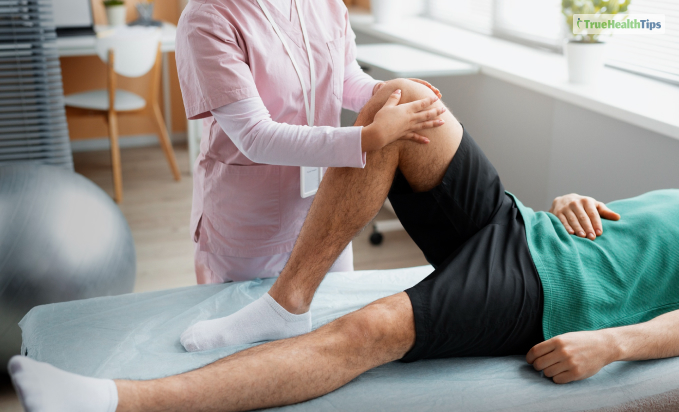
Do you suffer from chronic pain? Chronic pain is pain that does not go away even after an injury has healed, and this can have a serious impact on an individual’s physical and mental well-being. Those that live with chronic pain often find that daily activities become challenging.
It can drain them of energy, make them miserable and even make it hard to get enough sleep. There are all kinds of forms of chronic pain as well, including back pain, knee joints, shoulder pain, and ankle and foot chronic pain. So, what can you do if you or a loved one is suffering from chronic pain?
Find Effective Relaxation Techniques

One of the worst aspects of chronic pain is the impact that it can have on your mental health. It is easy to become frustrated, angry, and sad when you experience chronic pain, but stress can only make the pain more severe, which makes it a vicious cycle. This is why you need to find a relaxation technique that works for you, such as:
- Meditation
- Breathing exercises
- Yoga
- Reading
- Creative hobbies
Consider Cell-Based Treatments
There have been excellent advances made in cell-based treatments in recent times when it comes to chronic pain. There are minimally-invasive cell-based treatment options that can reduce or eliminate chronic pain.
These can be smaller and safer compared to some surgeries and treatment that uses the patient’s own blood, which means that there is no risk of allergies, reactions, or rejections. Specialists like bioxcellerator.com can offer treatment for chronic pain, and this could make a huge difference to your life in a few different ways. If you are living with pain, it is worth arranging a consultation to learn more.
Join A Support Group

Those that suffer from chronic pain often feel like they are the only person in the world that suffers. This is not true, and it can make a big difference in meeting and talking with other people that suffer from chronic pain. It is never too hard to find a support group, whether this is in-person or online, and it can be immensely helpful to hear other people’s stories, vent your frustrations, and get advice from others.
Read Also: What Is Abdominal Pain And How To Cure It?
Speak To Your Doctor About Painkillers
Obviously, painkillers can be helpful when it comes to living with chronic pain, but you must also be careful because they can have side effects, and you need to make sure that you are not causing long-term damage. Therefore, it is important to speak with your doctor about the best approach when it comes to taking pain medication.
Physical Therapy

Physical therapy is also helpful for reducing pain, increasing mobility, and making daily activities much easier. It is important to get physical therapy from a professional so that they can tailor the program to your situation. You should also ask them about exercises that you can do that can help – it is important to remain active even with chronic pain.
Chronic pain can interfere with just about every aspect of life and have a serious impact on your mental well-being. Hopefully, the information in this article will help you to find some relief and get back to a pain-free lifestyle.
Symptoms and Causes of Chronic Pain You Should Know
Symptoms of Chronic Pain

1. Persistent Pain: The hallmark symptom of chronic pain is persistent discomfort or distress that lasts beyond the expected time for tissue healing. This pain may be dull, aching, burning, throbbing, stabbing, or shooting in nature, and it may vary in intensity from mild to severe. Chronic pain can affect any part of the body, including muscles, joints, bones, nerves, and internal organs.
2. Reduced Range of Motion: Chronic pain can lead to stiffness, tightness, or decreased flexibility in the affected area, limiting mobility and range of motion. Individuals may experience difficulty performing daily activities, such as walking, standing, bending, or lifting, due to pain and stiffness.
3. Fatigue and Sleep Disturbances: Chronic pain can interfere with sleep quality and duration, leading to fatigue, daytime drowsiness, and impaired cognitive function. Sleep disturbances may include difficulty falling asleep, staying asleep, or experiencing restorative sleep, exacerbating feelings of exhaustion and impacting overall quality of life.
4. Emotional Distress: Chronic pain is often accompanied by emotional distress, including depression, anxiety, irritability, and mood swings. The constant burden of pain can take a toll on mental health and well-being, leading to feelings of helplessness, hopelessness, and social isolation.
5. Functional Impairments: Chronic pain can impair physical function and performance, leading to limitations in activities of daily living, work-related tasks, recreational activities, and social interactions. Individuals may experience difficulty concentrating, focusing, or maintaining productivity due to pain-related distractions and discomfort.
Causes of Chronic Pain

1. Musculoskeletal Conditions: Chronic pain is commonly associated with musculoskeletal conditions such as osteoarthritis, rheumatoid arthritis, fibromyalgia, and low back pain. These conditions involve inflammation, degeneration, or damage to the bones, muscles, joints, ligaments, or tendons, leading to persistent pain and discomfort.
2. Neuropathic Conditions: Neuropathic pain results from dysfunction or damage to the nervous system, including peripheral nerves, spinal cord, or brain. Conditions such as diabetic neuropathy, postherpetic neuralgia, trigeminal neuralgia, and spinal cord injury can cause neuropathic pain characterized by shooting, burning, or electrical sensations.
3. Chronic Illnesses: Chronic pain may accompany various chronic illnesses and medical conditions, including cancer, multiple sclerosis, inflammatory bowel disease, endometriosis, migraine and headaches. These conditions can cause persistent pain due to inflammation, tissue damage, nerve compression, or systemic effects on the body.
4. Traumatic Injuries: Traumatic injuries, such as fractures, sprains, strains, and soft tissue injuries, can result in chronic pain if not adequately treated or if complications arise during the healing process. Scar tissue formation, nerve damage, and altered biomechanics may contribute to ongoing pain and dysfunction following an injury.
5. Psychological Factors: Psychological factors, including stress, anxiety, depression, and trauma, can influence the experience of chronic pain and exacerbate its severity and duration. Emotional distress can amplify pain perception, trigger pain flares, and interfere with coping mechanisms and pain management strategies.
6. Lifestyle Factors: Lifestyle factors such as poor posture, sedentary behavior, obesity, smoking, and unhealthy diet can contribute to chronic pain by exacerbating underlying health conditions, impairing circulation, and increasing inflammation and oxidative stress in the body. Making positive lifestyle changes, such as engaging in regular exercise, maintaining a healthy weight, and managing stress, can help alleviate chronic pain and improve overall well-being.
Conclusion
Thus, living with chronic pain is not easy when you think about all the complications that you go through. The complications can be controlled with the help of preventative measures, and lifestyle changes.
Before making any changes in your lifestyle, consult your physician to avoid any side effects.
Read Also:











